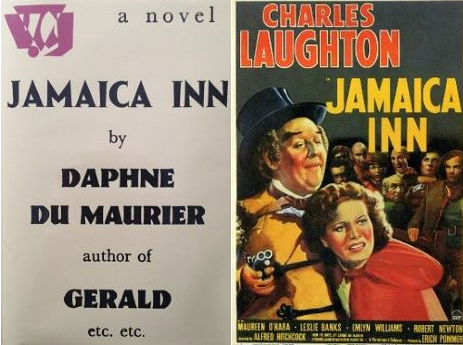A coaching inn was built on Bodmin Moor in 1750, though one has stood on that site two centuries longer. Its name probably stems from the local landowners, who were once governors of Jamaica. Smugglers indeed worked on that lonely moor, carrying contraband from the shore, seventeen miles away, from which point they would distribute it to distant points. The coming of the Coast Guard ended the age of wreckers and certainly made life harder for general smugglers. One day in 1930, Daphne du Maurier stayed there, became fascinated by its history, and wrote a novel about it which Alfred Hitchcock would later turn into a movie.
The book is the story of Mary Yellan. Her parents are dead; her only relative in the world is her mother’s sister, Patience Merlyn, who lives at Jamaica Inn with her husband, Joss. Mary goes there, though she is told that Jamaica Inn is not a safe place or a good place. She finds her once bright and cheerful aunt a faded, scared woman, hard under the thumb of Joss. Mary is told she must work in the bar when it’s needed—which turns out to be only Saturday nights—and when she is sent to bed to hide under the bedclothes and keep silent. Instead, Mary sneaks out of her room and discovers the secret of Jamaica Inn—that Joss is running a gang of smugglers out of there.
In the book, Mary Yellen (Maureen O’Hara) is dropped off from the coach before she reaches Jamaica Inn; the coach will not stop there. She ends up at the house of Sir Humphrey Pengallon (Charles Laughton), who sends her on her way to Jamaica Inn. A member of the gang, Jem Trehearne (Robert Newton), is accused of stealing from them. Joss Merlyn (Leslie Banks) ties Treharne up and plans to kill him, but Mary frees him, and the pair attempt an escape.
As it happens, I saw the movie first and read its trivia. Therefore, when the real mastermind of the plot shows up in the book, I knew it was him—the character is changed in the movie because strictures of the Code forbid someone of his specific profession from being a villain in a movie. Now, I’m not sure I would have trusted him anyway, because he’s one of those characters who’s definitely coming across as too nice out of nowhere. It feels wrong. I dislike that the Code meant that anyone would be required to be shown in a positive light simply because of their profession anyway.
I suspect that’s only one of the things Daphne du Maurier disliked about the adaptation—well, if it’s any consolation to her, Hitchcock didn’t much like it, either. Part of that seems to have been conflict with Charles Laughton. They were both very strong-willed men. One of the weirder stories of the shoot is that Laughton refused to appear in long shots until he’d figured out how Sir Humphrey would walk. And of course there are the changes from the Code—I suspect that Jem Merlyn changed into Jem Trehearne in part because of the Hays Office. After all, Jem Merlyn is a horse thief who only narrowly escapes hanging.
Frankly, I only really like one of Hitchcock’s du Maurier adaptations. The Birds leaves me flat—not a popular opinion, but here we are—and Jamaica Inn is one of his more forgettable efforts. Honestly, I think Rebecca is his first great movie, and it might not be until Rope that he settled into consistent greatness. Some of the movies before then are good, but also this isn’t one of them. I’m not sure anyone at the time thought so, either. I don’t think anyone involved in it had the least doubt that this was a movie that definitely could have been better.
Mind you, so could the book. I don’t especially like Mary. She’s smart and daring until the plot requires her to wilt. She prides herself on keeping secrets, but she talks to pretty well everyone she meets about what’s going on at Jamaica Inn. She despairs of her aunt’s choice in Joss Merlyn, and in fact she immediately dislikes Jem because of his resemblance to his brother, yet she gets over that awfully quickly. It also doesn’t seem as though she’s given room to grieve, and she connects to her aunt awfully quickly, though that also feels like a “when the plot demands” sort of thing.
The inn still stands on that moor; it’s got a smuggling museum in it now. O’Hara, Laughton, and Hitchcock would all go on to fine careers; Robert Newton, you will likely remember as Long John Silver from the Disney Treasure Island. Newton was born about a two and a half hour drive from Bodmin Moor, as it happens. Shaftesbury, Dorset, isn’t in Cornwall, but Newton was educated in Penzance, Cornwall, specifically mentioned in the book. Newton’s accent is now more famous than he is. Or this movie.
For next month, we follow Olivia de Havilland into The Snake Pit; help pay for me to acquire the book or movie by supporting my Patreon or Ko-fi!

